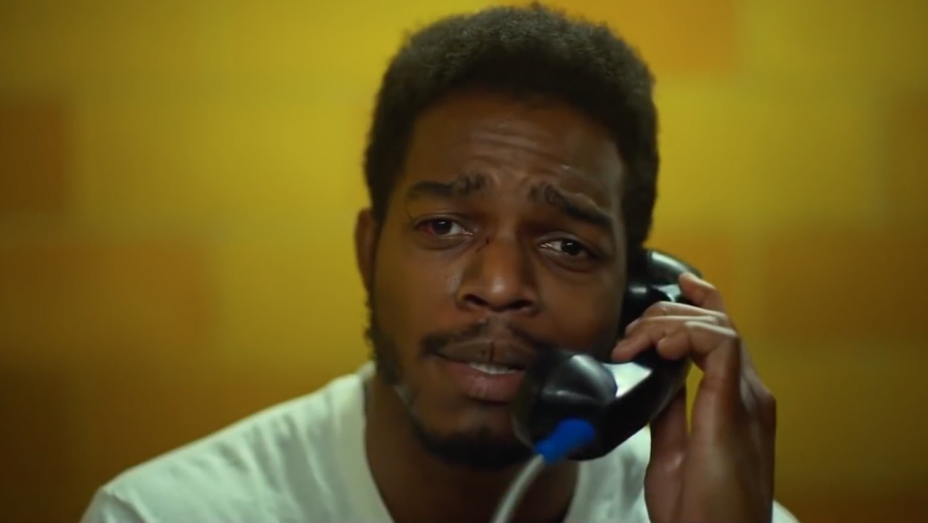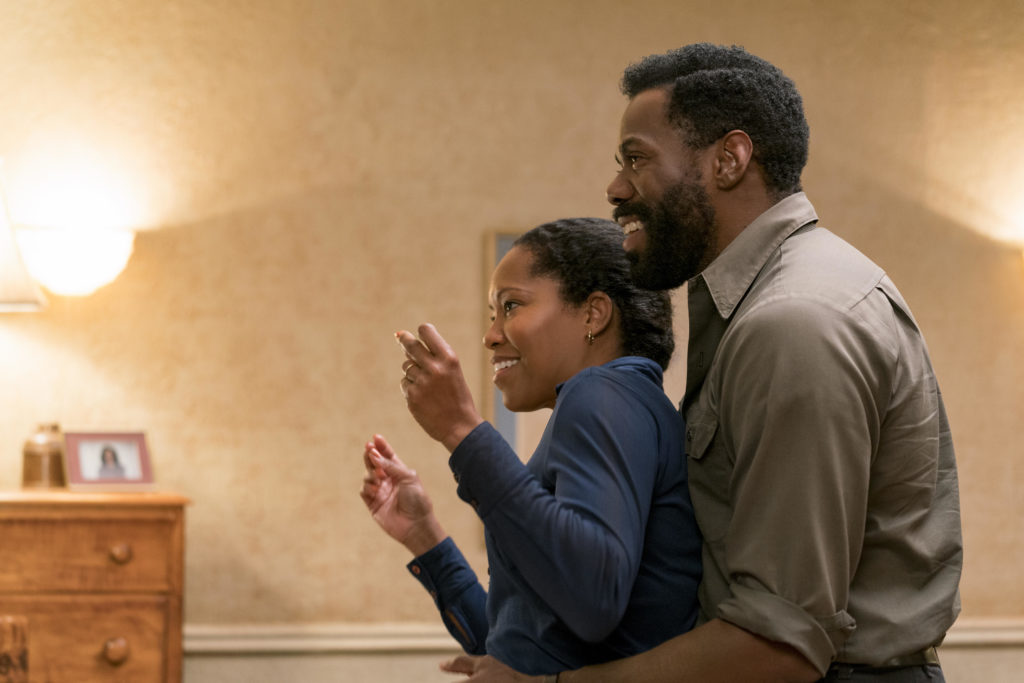
A movie awash in potent contradictions—intimate vs. operatic, reserved vs. vivacious, hopeful vs. disillusioned, wrongfully accused vs. savagely victimized—If Beale Street Could Talk opens with a quotation from James Baldwin, who wrote the novel upon which the film is based. The selected passage, which discusses “the impossibility and the possibility” (more contradictions!), directs “the reader” to draw certain inferences from what follows. This is a curious instruction, given that what follows is not a book but a movie; we aren’t readers, we’re viewers. It also illuminates the challenge that Barry Jenkins has accepted in choosing to adapt Baldwin’s novel, the tricky task of translating spiky words on a page to the visual language of the screen. In making If Beale Street Could Talk, Jenkins is attempting both to pay homage to one of the 20th century’s most important authors and to imbue that author’s prose with his own distinctly cinematic voice.
Not having read the novel, I can’t speak to the veracity of the on-screen result. What I can say is that, for the most part, this moving-picture version of If Beale Street Could Talk walks the line nicely, capturing Baldwin’s frustration and rage while also functioning as an honest-to-God movie. There are times when Jenkins’ ambitions get the better of him, and when the sheer scope of his undertaking threatens to overwhelm the particular plight of his characters. Yet even when he struggles to corral his myriad ideas into a tidy package (and to be sure, the film’s lack of tidiness is part of its point), Jenkins flaunts a vigorous command of his medium, breathing bold and colorful life into a story that is, in some ways, fairly black-and-white.
Or maybe it’s about right and wrong. The plot of Beale Street, which is set in Harlem in the 1970s, follows the predicament of Alonzo, known to most as “Fonny” (Homecoming’s Stephan James), a 22-year-old man who opens the movie behind bars after being charged with raping a Puerto Rican woman named Victoria (Emily Rios). Fonny’s 19-year-old girlfriend, Tish (KiKi Layne), is pregnant, a happy development that nonetheless amplifies the looming peril of Fonny’s criminal case. They’re desperate to get his charges dismissed before the baby arrives, and certain elements of Beale Street function as a courtroom procedural without the courtroom; Tish retains an idealistic young lawyer (Finn Wittrock) to handle Fonny’s case, along with an investigator tasked with locating Victoria in the hope that she’ll recant her accusation.

The legal particulars are hardly the focal point of Beale Street, but they do place Jenkins in a precarious position. The movie proceeds with the implicit understanding that Fonny is innocent. This is crucial to its themes—after all, the film is about the unjust deprivation of a black man’s freedom—but it in turn means that Victoria is lying. This is a dangerous message to send, given what we know about the rarity of false sexual assault allegations, and it’s possible to perceive the movie as giving Victoria’s own trauma short shrift. Still, Jenkins takes pains to sympathize with Victoria rather than demonize her. One of the film’s most wrenching sequences centers on Tish’s mother, Sharon (Regina King), traveling to Puerto Rico and pleading with Victoria to tell the truth; it’s beautifully performed by King (plus, Pedro Pascal shows up briefly, which is always a bonus), but it also acknowledges Victoria’s agony, suggesting that America is more than capable of disserving multiple demographics.
The villain of Beale Street, of course, is not Victoria. Nor is it Fonny’s mother (Aunjanue Ellis), a disapproving puritan who laments the impending birth of her grandchild, yet another mouth she’ll have to feed. It certainly isn’t Tish’s gregarious father (Colman Domingo, very good), who resolves to boost the family’s income through extralegal means. It isn’t even Officer Bell (Ed Skrein), the openly racist cop who fingers Fonny for the crime. No, the villain of this movie is The System, the institutional mechanisms that operate, with unfettered power and alarming efficiency, to disenfranchise and dehumanize black men. Jenkins is telling Tish and Fonny’s story, yes, but he is also telling the stories of the millions of black Americans who must strive for independence and equality in a society where racial discrimination is woven into the fabric of its history. This may be why Jenkins, perhaps unnecessarily, periodically interrupts his narrative to insert still photographs of black citizens being arrested or working low-wage jobs, emphasizing the universality of his characters’ struggle.

Jenkins’ ambition is noble and his statement worthwhile, but the sweeping scope of Beale Street is something of a double-edged sword. In making room for social commentary, it tends to crowd out its lead characters, particularly in terms of their romance. There’s an intriguing contrast between the reticent Tish and the charismatic Fonny—a difference in personality that may explain why James’ performance pops a bit more than Layne’s—but the details are largely missing. We know that they love each other because they say they do, repeatedly, whether to one another through thick prison glass or to us in the form of Tish’s somber, literate voiceover. But we’re essentially forced to take their devotion as a given; with the exception of a charming scene where they hunt for an apartment and Fonny pantomimes installing a phantom refrigerator, there are few moments that articulate the eccentricities of their affection.
Yet even if Beale Street doesn’t quite live up to its potential as a swooning romance, it remains enchanting as a piece of cinema, full of vivid craft. Alternating between intimate close-ups and wide-screen compositions—the film’s opening shot, which tracks Tish and Fonny from overhead as they stroll along a walkway, is a breathtaking introduction—Jenkins brings a rich texture to the material, bathing his characters’ tribulations in warmth and compassion. This tenderness is only enhanced by the work of his regular collaborators, in particular James Laxton’s fluid cinematography and Nicholas Britell’s gently enveloping score.

Eschewing the graceful linearity of Moonlight, Jenkins slides back and forth in time, toggling between the tentative happiness of Tish and Fonny’s nascent relationship and the aftermath of his incarceration. This results in a number of dialogue-driven scenes, during which a complementary battle takes shape between the slightly mannered nature of Baldwin’s words and the dynamism of Jenkins’ direction. An early sit-down between Tish and Fonny’s families, which devolves into a series of ugly threats and insults, carries the sting of Eugene O’Neill; the language is vicious, but the staging is alacritous, giving Baldwin’s already-sharp dialogue even more bite. And later, Fonny runs into a childhood chum (Brian Tyree Henry), an ex-con who suddenly casts a dark, mournful shadow over the film with a crushing monologue about how the penal system strips its inhabitants of their very identity.
That’s upsetting stuff. But even as it honors the anger and the impotence that animated Baldwin’s novel, If Beale Street Could Talk never feels like a tragedy or a dirge. It offers instead a measure of melancholic hope, a faint suggestion that the forces of humanity might someday overpower the institutional rot that continues to fester in modern America. And so, the most powerful contradiction on display proves to be the one between devastation and resilience. Fonny’s freedom may be lost, but his spirit—along with that of his insightful, gifted director—proves much harder to break.
Jeremy Beck is the editor-in-chief of MovieManifesto. He watches more movies and television than he probably should.
